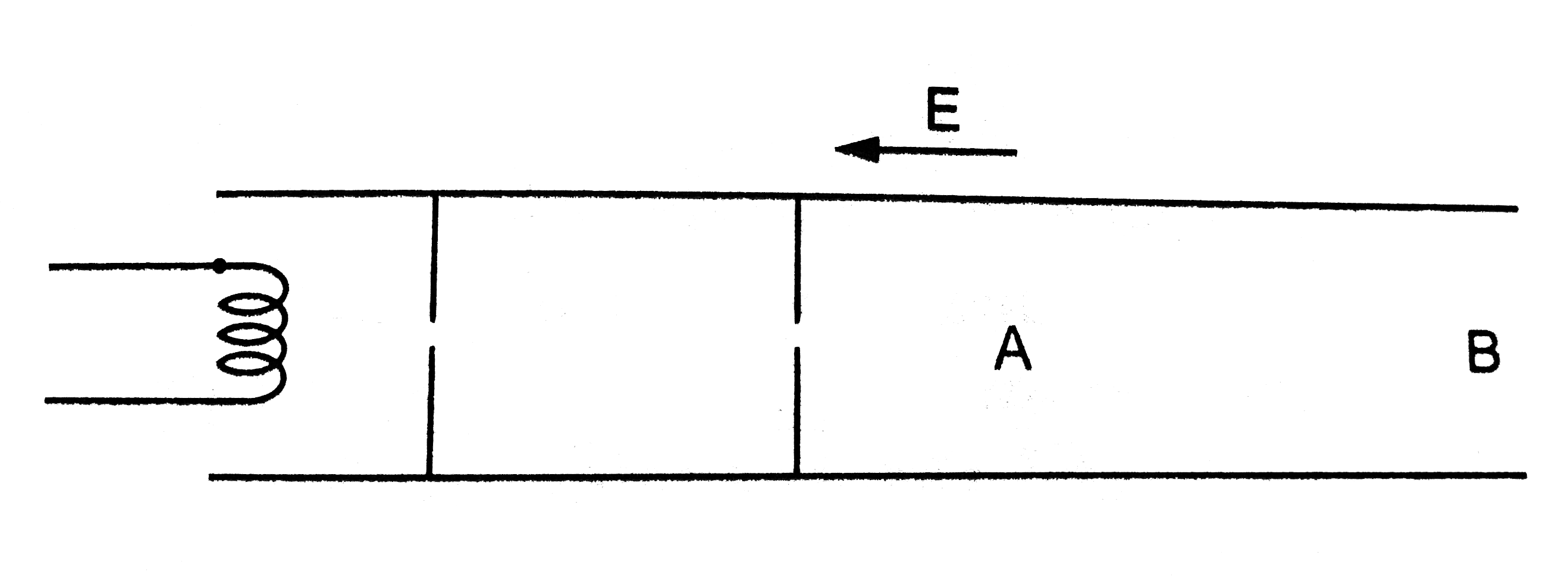By evaluating ∫i2Rdt,show that when a capacitor is charged by connecting it to a battery through a resistor,the energy dissipated as heat equals the energy stored in the capacitor.Solution in Gujrati
i2rdt=i0re−2trcdt
=i0re−2t/rcdt
=i0r(−rc2)e−2t/rc
=12ci0r2e2t/rc=12cv2. (Proved)
Topper's Solved these Questions
- BOOK - HC VERMACHAPTER - ELECTRIC CURRENT IN CONDUCTORSEXERCISE - Objective 29videos
ELECTRIC CURRENT IN CONDUCTORS
- BOOK - HC VERMACHAPTER - DISPERSION AND SPECTRAEXERCISE - Exercises11videos
DISPERSION AND SPECTRA
- BOOK - HC VERMACHAPTER - ELECTRIC CURRENT THROUGH GASESEXERCISE - Exercises23videos
ELECTRIC CURRENT THROUGH GASES
Similar Questions
Electrons are emitted by a hot filament and are accelerated by an electric field as shown in figure .The two stops at the left ensure that the electron beam has a uniform cross-section.
 01:53View Solution
01:53View SolutionA flint glass prism and a crown glass prism are to be combined in such a way that the deviation of the mean ray is zero. The refractive index of flint and crown glasses for the mean ray are 1.620 and 1.518 respectively. If the refracting angle of the flint prism is 6.0∘, what would be the refracting angle of the crown prism ?
04:05View SolutionA discharge tube contains helium at a low pressure. A large potential difference is applied across the tube. Consider a helium atom that has just been ionized due to the detachment of an atomic electron. Find the ratio of the distance travelled by the free electron to that by the positive ion in a short time dt after the ionization.
02:14View SolutionAn uncharged capacitor is connected to a battery. Show that half the energy supplied by the battery is lost as heat while charging the capacitor.
01:34View SolutionBy evaluating ∫i2Rdt,show that when a capacitor is charged by connecting it to a battery through a resistor,the energy dissipated as heat equals the energy stored in the capacitor.
02:02View SolutionAn Uncharged capacitor C is connected to a battery through a resistance R. Show that by the time the capacitor gets fully charged, the energy dissipated in R is the same as the energy stored in C.
03:23View SolutionWhen a charged capacitor is discharged through a resistor, heat is produced in the resistor
In charging a capacitor, energy is stored in the capacitor.02:18View SolutionAn uncharged capacitor is connected in series with a resistor and a battery. The charging of the capacitor starts at t=0. The rate at which energy stored in the capacitor:-
01:41View SolutionA battery of 10V is connected to a capacitor of capacity 0. lF . The battery is now removed and this capacitor is connected to a second uncharged capacitor. If the charges are distributed equally on these two capacitors, find the total energy stored in the two capacitors. Find the ratio of final energy to initial energy stored in capacitors.
04:57View SolutionA capacitor is charged with a battery and energy stored is U. After disconnecting battery another capacitor of same capacity is connected in parallel with it. Then energy stored in each capacitor is:
03:19View Solutionएक बैटरी द्वारा संधारित्र को आवेशित किया जाता हैं। संधारित्र में संचित ऊर्जा तथा बैटरी द्वारा दी गई ऊर्जा का अनुपात हैं-
02:09View SolutionIf an uncharged capacitor is connected to a battery, then show that half of the energy supplied by the battery to charge the capacitor is dissipated as heat.
03:51View Solutionएक अनावेशित संधारित्र को बैटरी से जोड़ा जाता है | दर्शाइए की संधारित्र को आवेशित करने के लिए बैटरी द्वारा प्रयोकोट की गई ऊर्जा का आधा भाग उष्मा के रूप में क्षय होता है |
02:10View SolutionAn uncharged capacitor is connected to a battery. Show that half the energy supplied by the battery is lost as heat while charging the capacitor.
02:15View SolutionBy evaluating ∫i2Rdt,show that when a capacitor is charged by connecting it to a battery through a resistor,the energy dissipated as heat equals the energy stored in the capacitor.
03:19View SolutionAn Uncharged capacitor C is connected to a battery through a resistance R. Show that by the time the capacitor gets fully charged, the energy dissipated in R is the same as the energy stored in C.
02:20View Solution

